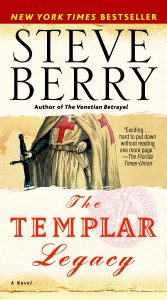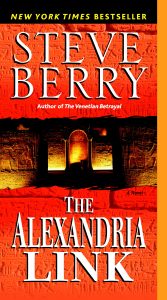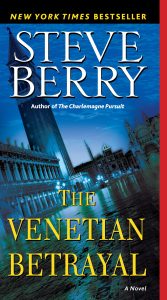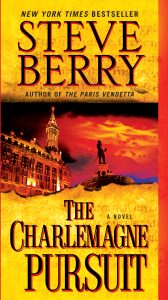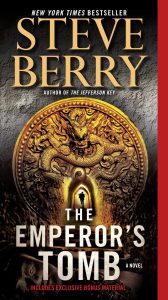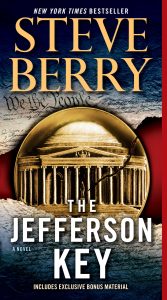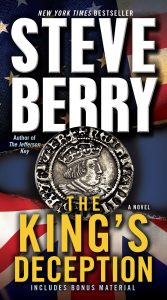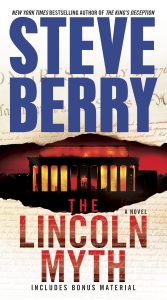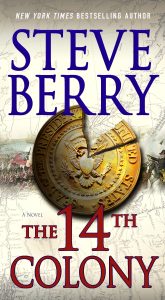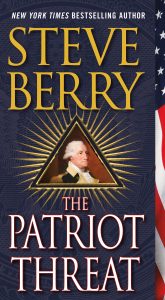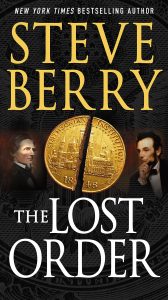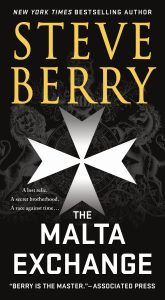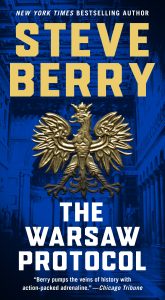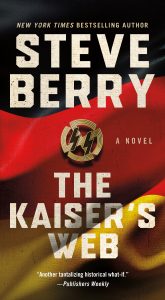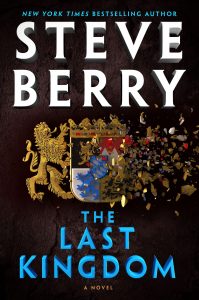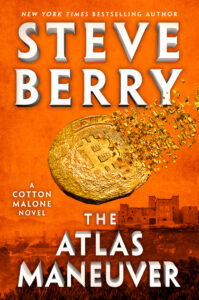The Bishop’s Pawn
Cotton Malone Series Book 13
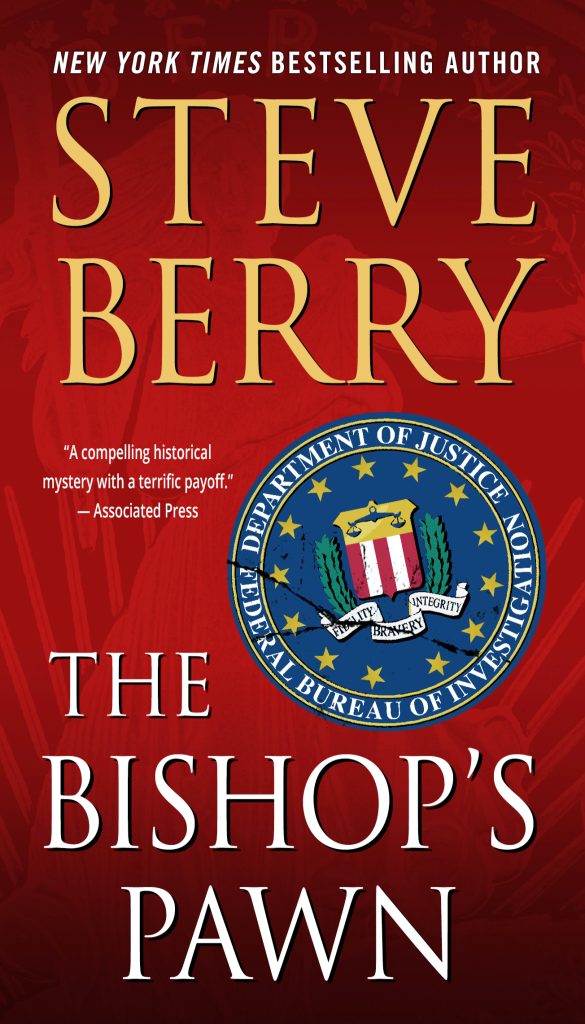 Buy the Book:
Buy the Book:Amazon
Apple Books
Barnes & Noble
IndieBound
Kobo
Audible
Libro.fm
Amazon Canada
Synopsis
Cotton Malone’s first case.
History notes that the ugly feud between J. Edgar Hoover and Martin Luther King, Jr., marked by years of illegal surveillance and the accumulation of secret files, ended on April 4, 1968, when King was assassinated by James Earl Ray.
But that may not have been the case.
Now, fifty years later, former Justice Department agent, Cotton Malone, must reckon with the truth of what really happened that fateful day in Memphis.
It all turns on an incident from eighteen years ago, when Malone, as a young Navy lawyer, is trying hard not to live up to his burgeoning reputation as a maverick. When Stephanie Nelle, a high-level Justice Department lawyer, enlists him to help with an investigation, he jumps at the opportunity. But he soon discovers that two opposing forces—the Justice Department and the FBI—are at war over a rare coin and a cadre of secret files containing explosive revelations about the King assassination, information that could ruin innocent lives and threaten the legacy of the civil rights movement’s greatest martyr.
Malone’s decision to see it through to the end —— from the raucous bars of Mexico, to the clear waters of the Dry Tortugas, and ultimately into the halls of power within Washington D.C. itself —— not only changes his own life, but the course of history.
“He nails it . . . Berry’s most personal novel to date.”
— Washington Post
“A tour de force that’s everything a great thriller is supposed to be.”
— Providence-Journal
“Bestseller Berry’s “rookie foray into full length, novel-sized, first-person narrative, as he calls this Cotton Malone thriller in the afterword, ingeniously mixes mystery and history to cast a surprising light on the assassination of Martin Luther King, Jr. in 1968. An effective conspiracy yarn.”
— Publisher's Weekly
"The Malone novels rely on fast pacing, well-orchestrated action and snappy dialogue to keep us flipping the pages. Once you start reading this one, you’ll have a heck of a time stopping until you’ve come to the end.”
— Winnipeg Free Press
"Berry has always ‘hit it out of the park’ with his books. With this, he’s basically hit it to the moon and back. It is that good.”
— Suspense Magazine
"The Bishop's Pawn is an entertaining read for thriller fans who enjoy a mix of fictional adventure and historical fact. Intended as a tribute to Dr. King on the 50th anniversary of his death, it also reflects Steve Berry’s devotion to historic preservation and remembrance of the past.”
— New York Journal of Books
"Berry deftly weaves historical facts and made-up fiction — so deftly, in fact, that readers would be wise to read the eight-page author’s note that closes the book to clarify what actually happened and what didn’t. [He] . . . creates a very compelling story that is entirely plausible.”
— Florida Times-Union
“Berry mixes historical facts with his own fictions in a manner that readers of this terrific series have come to love. The Bishop's Pawn keeps the suspense building until the final pages. It’s one of the best books in a wonderful series.”
— Connecticut Post
"As fast-paced and exciting as all his previous books, this is another winner in the author’s bestselling series.”
— Library Journal (starred review)
“It took him a while — a dozen books — to get around to it, but Berry has finally written Cotton Malone’s origin story . . . an exciting tale of historical intrigue."
— Booklist
“Steve Berry opens up a Pandora’s Box of unanswered questions surrounding the murder of [Martin Luther King, Jr.]. A riveting adventure, told in Berry’s trademark style of pairing meticulously researched history with unexpected twists.”
— Southern Seasons Magazine
"This Cotton Malone case is a fast-paced, heart-pounding thriller with dark corners and passageways. The action hits the ground running and does not let up until the end. Steve Berry is a talented author who shakes things up by presenting alternate versions to historical events."
— Romantic Times Magazine (Four stars. Fantastic. A keeper.)
"In The Bishop's Pawn, [Berry] imagines a gripping, provocative thriller about an American icon.”
— bookreporter.com
FROM THE BLOG WORLD
"The Bishop's Pawn is a look back in history that has you on the edge of your chair reading. Once again Steve Berry has taken history, looked at what is possible, and written it down very well, making it exciting for the reader. No way you read one of his books and don't google events from that time frame. Lovers of history, thrillers, and mysteries will love The Bishop's Pawn.”
— freshfiction.com
"The Bishop's Pawn breathlessly melds history with mystery, culminating in a conclusion that may prove as controversial as it does compelling. As always, Steve Berry has done his due diligence, offering readers fact-based fiction that should provoke thought without sacrificing the sanctity of Martin Luther King Jr.’s legacy.”
— criminalelement.com
"Steve Berry is back with another timely thriller that examines what we really know about the civil rights movement’s greatest martyr. . .The Bishop's Pawn is well-written, daring, and packed full of everything Berry’s fans have come to expect from one of his novels.”
— The Real Book Spy
"I thoroughly enjoyed all aspects of this piece and can only hope that others will also find something worthwhile. Kudos, Mr. Berry, for another winner. I cannot wait to see what you have in mind as you keep Cotton interesting and ever-evolving, even in his rookie days.”
— pecheyponderings.wordpress.com
“The Bishop's Pawn has a thrilling Alfred Hitchcock-style setpiece at Disney World and a propulsive chase structure that keeps the suspense building until the final pages. It’s one of the best books in a wonderful series.”
— Hearst CT News Blog
“I feel that while Steve Berry may have written better books, The Bishop's Pawn is beyond any doubt the most thought provoking of them. Totally mesmerizing and the “king” of all nighters.”
— bookbitch.com
Excerpt
Click here to listen to an excerpt from the audiobook, or read the excerpt below.
PROLOGUE
PRESENT DAY
How ironic, I think, that this all started with a murder and now it appears it might end with another.
I’d been summoned to a famous address, 501 Auburn Avenue, Atlanta, Georgia. The house is a two-story Queen Anne with a porch, scroll-cut trim, porthole windows, and a gabled roof. Part of a neighborhood with a famous name. Sweet Auburn. Once the home of hard working, middle-class, urban families, sixty years ago the neighborhood became the epicenter for a movement that ultimately changed the country. The African American couple who’d lived in this house had not wanted any of their children born in a segregated hospital, so all three arrived into the world right here. The first, a girl, Christine, came early, before a crib had even been found. So she spent the first few nights of her life in a chifforobe drawer. The youngest, Alfred Daniel, found the world on a hot July day. The middle child, a boy, born ironically in the middle room upstairs, appeared on January 15, 1929. They called him Michael, for his father. But five years later, after a trip to Berlin, the father changed both his and the son’s name to Martin Luther King, one senior, the other junior.
I’m standing in a quiet downstairs foyer. The invitation had arrived a week ago at my Copenhagen bookshop by regular mail, inside an envelope hand-addressed to me—Cotton Malone—and contained a note that simply read:
Fifty years have passed.
Bring them.
And then:
April 3. King house at MLK Center. 11:00 P.M.
With no signature.
But I knew who had sent it.
A few night-lights burn here and there in the darkened ground-floor rooms. Years ago, when I’d lived in Atlanta working for the Magellan Billet, I’d visited here one Sunday afternoon with Pam and Gary, a rare family outing of mother, father and son. We’d taken a tour of the house, then walked the entire King Center, trying to impress upon Gary the importance of racial equality. Both Pam and I prided ourselves on not having a prejudicial bone in our bodies, and we wanted our son to grow up the same way.
I glance into the front parlor with its famous piano and Victrola. The guide that day had told us how King himself had taken music lessons on that keyboard. Not one of the middle child’s fondest childhood memories, if I remember correctly.
We’d also learned a few other things about Martin Luther King Jr.
He’d attended elementary and high school nearby, and college across town at Morehouse. In 1954 the Dexter Avenue Baptist Church in Montgomery, Alabama, called him to be its pastor. But in 1955 when Rosa Parks was denied a seat in the front of the bus, for 381 days he led the Montgomery transit boycott. In 1957 he became president of the fledging Southern Christian Leadership Conference. Three years later he moved back to Atlanta and shared the pastor’s pulpit with his father at the Ebenezer Baptist Church, which still stands just down the street.
From there he evolved into the heart and soul of a great movement.
So many memorable speeches. Two massive legislative successes with the Civil Rights and Voting Rights Acts. A Nobel Peace Prize. Thirty arrests for the cause. All leading to Memphis and April 4, 1968, when an assassin’s bullet ended his life.
He’d been but thirty-nine years old.
I stare at the man standing in the shadows at the end of the ground floor hall. He’d definitely aged, but his face seems to have only become stronger with the years. His hair is grayer, the frame thinner, but the same air of gentle intellectualism remains, as does the stooped gait and short shuffle to each step as he approaches.
“Tomorrow will be a big day here,” he says in the low voice I recall. “Fifty years since King died.” He pauses. “Nearly twenty years since you and I last talked. I still feel the pain every day.”
A cryptic comment, but I expect no less. “Out of curiosity, how did we get in here tonight? This is a national historic site.”
“I have connections.”
Of that I have no doubt. It was the same years ago when all of this had started.
“Did you bring them?” he asks.
I reach into my back pocket and display what he’d asked for. “Right here.”
“You’ve kept them all these years, along with the secret. Quite an accomplishment.”
“My career was the protecting of secrets.”
“I kept up with you. You worked for the Justice Department what, ten years?”
“Twelve.”
“An agent with the Magellan Billet. Now you live in Denmark and own an old bookshop. Quite a change.”
There’s a gun tucked at his waist. I point. “Is that necessary?”
“We both knew, at some point, it would come to this.”
Probably so.
“You managed to move on,” he says. “Everything that happened only pushed you forward to greater things. That’s been impossible for me. I’m amazed I’ve lasted this long.”
It’s true. My life had been altered in ways I could have never then imagined. But what happened also taught me a valuable lesson.
“I came, tonight, for you,” I tell him.
“Lay everything on that side table, please.”
No point arguing, so I do as asked.
“The King family lived in this house a long time,” he says. “They raised three children under this roof, one of whom grew up and changed the world.”
“We both know it took more than just him to make that happen. You were a big part of that.”
“That’s kind of you to say. But it’s no conciliation.”
Only a handful ever knew what really happened, most of whom are now dead.
“Do you ever think about those few days?” he asks.
My time with the Magellan Billet had exposed me to some amazing things. Templars, a ruthless central Asian dictator, Charlemagne’s secrets, the lost library of Alexandria, modern-day pirates. But nothing compares to what I was involved with during my first mission.
Before there even was a Magellan Billet.
“All the time,” I say.
“Should the truth be told?”
A fair question. Fifty years have passed and the world has changed. But I point again and have to ask, “Is the gun for me, or you?”
He does not immediately answer.
I learned a long time ago that people’s actions were nearly always less tidy than their minds. So I decide to be cautious.
“I want to talk about it,” he finally mutters.
“And your choices of listeners are limited?”
He nods. “It’s eating me up. I need you to tell me everything that happened. We never had this conversation back then.”
I hear what he has not said. “Before what?”
“Before I decide which one of us this gun is for.”
CHAPTER ONE
June
18 Years Ago
Two favors changed my life.
The first happened on a warm Tuesday morning. I was cruising on Southside Boulevard, in Jacksonville, Florida listening to the radio. A quick stab at the SEEK button and through the car speakers came, “Why does New York have lots of garbage and Los Angeles lots of lawyers?”
“New York got first choice?”
Laughter clamored, followed by, “How do you get a lawyer out of a tree?”
No one seemed to know the answer.
“Cut the rope.”
“The other day terrorists hijacked an airliner full of lawyers.”
“That’s awful. What happened?”
“They threatened that unless their demands were met they would begin releasing one lawyer every hour.”
More laughter.
“What do lawyers and—”
I turned the radio off. The disc jockeys seemed to be having fun, lawyers apparently a safe object of ridicule. Hell, who was going to complain? It wasn’t like gay jokes, Polish jokes, or anything even remotely sexist. Everybody hated lawyers. Everybody told a lawyer joke. And if the lawyers didn’t like it, who gave a damn?
Actually, I did.
Since I was a lawyer.
A good one in my opinion.
My name, Harold Earl “Cotton” Malone, appeared as one of thousands at the time who held a license within the State of Georgia, where I’d taken the bar exam six years earlier. But I’d never worked at any law firm. Instead I was a lieutenant commander in the U.S. Navy, assigned to the Judge Advocate General’s corps, currently on duty at the naval station in Mayport, Florida. Today, though, I wasn’t acting as a lawyer. Instead, I was doing a favor for a friend, a distraught husband going through a divorce.
A favor I was beginning to regret.
The wife, Sue Weiler, possessed the cunning of a dictator and the boldness of a stripper. She’d spent yesterday parading across Jacksonville from apartment to apartment. Four in all. Men she’d met here and there. Fast sex with no strings. While sitting outside Apartment Number 3 I’d seriously wondered if she might be a nymphomaniac, as she certainly possessed the appetite.
Just past 5:00, after a surprisingly brief visit at Apartment Number 4, she folded her long slender legs into a sparkling new Cadillac and headed onto a busy boulevard. The car was a rosy shade of white, so pale that it looked pink. I knew the story. She’d specially ordered the car to enrage her estranged husband, the stunt entirely consistent with her taunting personality.
Last night she’d headed straight to an apartment complex on the south side and Boyfriend Number 5. A month ago she’d done the same thing and, being the pal that I was, I’d followed her then, too. Now the soon-to-be-ex-husband’s lawyer wanted pictures and, if possible, video to use in divorce court. My buddy had already been socked with temporary alimony, part of which was going to pay for the Cadillac. Proof of adultery would certainly stop all alimony. Especially since Sue had already twice testified that she possessed no lovers or hardly any male friends at all. She was an accomplished liar, and if I hadn’t seen the truth myself I would have believed her.
A light rain had fallen all yesterday afternoon, and the evening had been typically hot and humid for Florida in June. I’d spent the night rooted outside the apartment of Boyfriend Number 5 making sure Sue didn’t slip away. Fifteen minutes ago she’d emerged and sped off in the Pink Mobile. I speculated where she might be headed. An apartment complex out at the beach and Boyfriend Number 6, a title insurance agent with the advantage of forty pounds more muscle and twenty fewer years than her husband.
The morning was bright and sunny, the roads filled with commuters, Jacksonville traffic always challenging. My metallic blue Regal easily melded into the morning confusion, and following a nearly pink Cadillac presented little difficulty. Predictably, she took the same series of twists and turns across town until her left signal blinked and the Cadillac veered into another apartment complex.
I noted the time.
7:58 A.M.
Boyfriend Number 6 lived in Building C, Unit 5, with two assigned parking spaces, one for his late-model Mazda, the other for a guest. I’d discovered those details a few weeks ago. Half an hour from now, allowing plenty of opportunity for them to climb into the sack, I’d find a good spot to grab a little video and a few snapshots of the Cadillac beside the Mazda. In the meantime I’d wait across the street in a shopping center parking lot. To pass the time I had a couple of paperback novels.
I flipped on my right blinker and was just about to turn into the shopping center when a Ford pickup shot by in the left lane. I noticed the cobalt color, then the bumper sticker.
MY EX-WIFE’S NEW CAR IS A BROOM.
And knew the occupant.
My pal, the soon-to-be-ex-husband.
I’d last talked to Bob Weiler at midnight, calling in the bad news, none of which he’d liked. Him being here now meant only one thing—trouble. I’d sensed a growing resentment for some time. The seemingly blasé attitude the wife took to her husband’s jealousy. A delight in emotionally building him up, then enjoying while he crashed before her eyes. An obvious game of control. His for her affection, hers for the pleasure of being able to dictate his response. But such games carried risks and most times the participants could not care less about the consequences.
Bob’s pickup, in defiance to some substantial oncoming traffic, flew across the opposite lanes, tires squealing, and shot into the narrow drive, barely missing the carved cedar sign proclaiming the entrance to The Legends. I aborted my right turn, changed lanes and, taking advantage of some rubberneckers, followed. Traffic momentarily blocked my approach, and by the time I finally made the turn into the complex Bob was a good ninety seconds ahead of me.
I headed straight for Building C.
The truck was stopped, its driver’s-side door open. The pink Cadillac sat parked beside the Mazda. Bob Weiler stood with a gun leveled at his wife, who’d emerged from her car but had yet to go inside. I whipped the steering wheel to the right and slammed the Regal into park. Groping through the glove compartment I found my Smith & Wesson .38 and hoped to God I didn’t have to use it.
I popped open the door and slid out. “Put it down, Bob.”
“No way, Cotton. I’m tired of this bitch playing me for a fool.” Bob kept his gun trained on Sue. “Stay out of this. This is between me and her.”
I stayed huddled behind my open car door and glanced left. Several residents watched the unfolding scene from railed balconies. I stole a quick look at the wife, fifty feet away. Not a hint of fear laced her gorgeous face. She actually looked more annoyed than anything else, watching her husband intently, the look reminiscent of a lioness surveying her prey. A stylish Chanel purse draped one shoulder.
I turned my attention back to Bob Weiler. “Put the gun down.”
“This bitch is milking me while she screws whoever she wants.”
“Let the divorce court handle her. We’ve got enough now.”
He turned toward me. “The hell with courts. I can deal with this right now.”
“For what? Prison? She’s not worth it.”
Two shots cracked in the morning air and Bob Weiler let out a groan, then his body crumpled to the ground. Blood poured from a pair of holes in his chest. My gaze darted toward Sue. Her gun was still raised, only now it was pointed at me.
Another shot exploded.
I dove into the Regal.
The driver’s side window, where I’d just been crouched, exploded, spraying glass on me.
She fired again.
The front windshield spiderwebbed from the impact but did not splinter. I snapped open the passenger-side door and slid out onto the pavement. Now at least a whole car was between us. I sprang up, gun aimed, and screamed, “Drop the gun.”
She ignored me and fired one more time.
I ducked and heard the bullet ricochet off the hood. I came up and sent a round her way, which pierced Sue’s right shoulder. She recoiled, trying to keep her balance, then she dropped to the pavement, losing a grip on her weapon. I rushed over and kicked the pistol aside.
“You no-good piece of crap,” she yelled. “You shot me.”
“You’re lucky I didn’t kill you.”
“You’re going to wish you did.”
I shook my head in disbelief.
Wounded and bleeding, but still venomous.
Three Duval County Sheriff’s cars with flashing lights and screaming sirens entered the complex and closed in fast. Uniformed officers poured out, ordering me to drop my gun. All of their weapons were pointed my way, so I decided not to tempt fate and did as they asked.
“This bastard shot me,” Sue screamed.
“On the ground,” one of the cops said to me. “Now.”
Slowly I dropped to my knees, then laid belly-first on the damp parking lot. Immediately, my arms were twisted behind my back, a knee pressed firm to my spine, and cuffs snapped onto my wrists.
So much for favor number one.
Also in this series:
